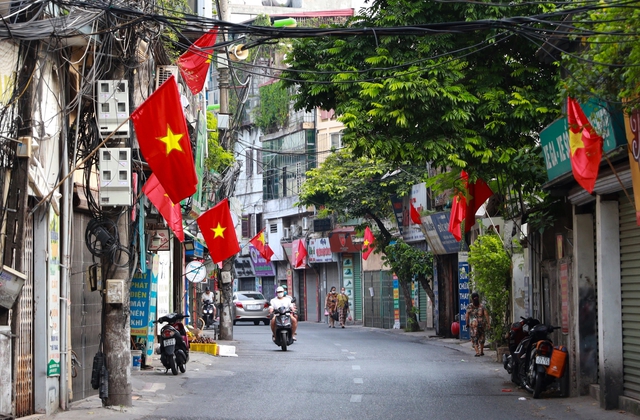Viet Nam at a glance
VGP – On this day 79 years ago, President Ho Chi Minh read the Declaration of Independence at the Ba Dinh Square in Ha Noi capital, solemnly announcing to the world the birth of the Democratic Republic of Viet Nam, now the Socialist Republic of Viet Nam

A street in Hà Noi capital is decorated with national flags
Right after gaining indpendence, Viet Nam had to embark on long resistance war against French colonists and then American emperialists until 1975 when the Southeast Asian country was reunited.
From 1979 to 1986, Viet Nam went through serious crisises, partly due to non-uniformity between production forces and production produciton relations.
In 1986, the 6th National Party Congress decided to initiate a comprehensive renewal process, taking economic reform as the core. From this perspective, the country began to transform economic structure, develop diverse economic sectors, reform management mechanisms, abolish subsidisation, and step by step transition to a socialist-oriented market economy.
Entering the 21st century, Viet Nam has gained significant achievements in socio-economic development. The average GDP growth rate for the 2021-25 period is estimated at 5.7-5.9 per cent per year, among the highest groups in the region and the world.
The scale of the economy is expected to increase by 1.45 times to top US$500 billion by 2025. Per capita income will rise substantially from US$3,400 USD to approximately US$4,650, positioning Viet Nam Nam in the upper-middle-income group in 2025.
The macroeconomic environment is stable, inflation is controlled, and policies are implemented flexibly and effectively. Viet Nam's international standing and reputation are continually rising, with high economic growth rates and significantly improved living standards.
By 2025, the workforce is expected to reach 53.2 million people, with a positive shift in structure. The proportion of labourers in agriculture will decrease significantly to 25.8 per cent, and the quality of human resources will continually improve with 70 per cent of the workforce receiving training.
From a land without a name on the world map, from a war-torn country, Viet Nam has risen to become a symbol of peace, stability, hospitality, and a destination for international investors and tourists.
From a backward economy, Viet Nam has emerged to be among the top 40 leading economies, with a trade volume in the top 20 economies in the world, an important link in 16 free trade agreements involving 60 major economies in the region and the world.
From an isolated country, Viet Nam has established diplomatic relations with 193 countries around the globe, strategic and comprehensive partnerships with 30 countries including all permanent members of the United Nations Security Council and major countries, and is an active member of more than 70 regional and international organizations.
As happiness and prosperity as the goal to strive for, Viet Nam is considered by the United Nations and international friends as a success story, a bright spot in poverty reduction, constantly improving the material and spiritual life of the people.
Looking forward to the future, Viet Nam, under the leadership of the Communist Party of Viet Nam will certainly enter the a new era, an era of rising up, constantly striving, making greater contributions to maintaining peace, stability and development in the region and the world by promoting the spirit of self-reliance, self-confidence, and national pride, taking the great national solidarity and pure international solidarity as the driving force, strongly mobilizing the people's strength, closely linking the Party's will with the people's hearts as the foundation.
The Party, State and people of Viet Nam wish to continue to receive support and cooperation from friends, partners and peace-loving people around the world, in which diplomats, heads of international organizations in Viet Nam and foreign investors play the bridging role in the process of national construction and development.
Building on the past achievements, Viet Nam is confident to join hands with partners and friends around the world to overcome challenges and seize opportunities in order to gain greater achievements and build a world of peace and sustainable development, and shape a fair international political and and economic order based on the fundamental principles of the United Nations Charter and international law./.
